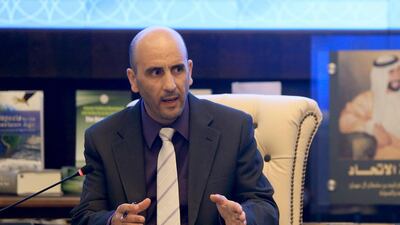ABU DHABI // Problems with funding, ineffective data collection at an institutional level and a preference to publish research papers in Arabic instead of English remain the major obstacles facing universities in the Middle East hoping to climb international rankings.
Despite several UAE institutions making it into the Times Higher Education rankings for the Mena region for the first time this year, other universities will struggle unless these issues are addressed, according to academics.
Speaking at the Emirates Centre for Strategic Studies and Research, Dr Said Saddiki, associate professor of international law and international relations at Al Ain University, said that although regional universities publish a lot in Arabic, their standing remains weak because researchers’ citations are still low.
“Measurements don’t depend on the publications, but the citations. The English language is favoured,” he said.
In international rankings, citations are measured in English and the top journals are published in English.
The Times Higher Education, QS and Shanghai rankings look at different criteria, with each weighted differently. These range from number of citations to research activity, international student body, quality of student life and range of programmes offered.
In the Times rankings for the Mena region, UAE University was 11th, American University of Sharjah 17th and Petroleum Institute in Abu Dhabi 20th.
Abu Dhabi University, UAE University and the American University of Sharjah have all made it into the QS rankings in the 400+ category. A mandate by the UAE Ministry of Higher Education ensures that the majority of classes are taught in English.
In response to what he sees as “Westernised criteria”, Bayan Hani Harab, a former professor and now education consultant, called for the creation of Arab rankings compiled by Arabs.
“We need Arab criteria, evaluating ourselves in our own language. We need to classify ourselves rather than have those outside classifying us.”
However, Dr Saddiki said this was not a solution, because universities still want to be placed on the international stage alongside the world’s brightest and best.
“If we rank ourselves, we may not offer a service to the universities that are competing with international universities,” he said. “We need to include international criteria.”
Dr Saddiki said funding was an ongoing concern because “there is a lack of comprehensive policies to reach international standards” blaming a “weakness of participation” by the private sector to fund research. “More than 90 per cent of funding comes from the public sector.”
In the US, most of the investment in universities comes from the private sector.
Arab universities, said Dr Khalid bin Hamdan from Abu Dhabi Police, are too focused on quantity and not quality.
“We are interested in grades, the individual rather than group work. The support of our countries for higher education, if we measure that support compared to western countries, is very weak.”
Suha Sayed, from the Office of Scholastic Donations, said key data was often lacking, which means submitting applications for rankings was difficult.
“At UAE University two years ago there was a conference regarding this issue of rankings and the most important issue was the subject of data. It’s very hard to get data. We were really surprised when it comes to the universities whether in the UAE or other Arab countries, they don’t have any consistent, well-managed, clear data.
“Getting information from universities is hard, it’s a real challenge.”
mswan@thenational.ae

